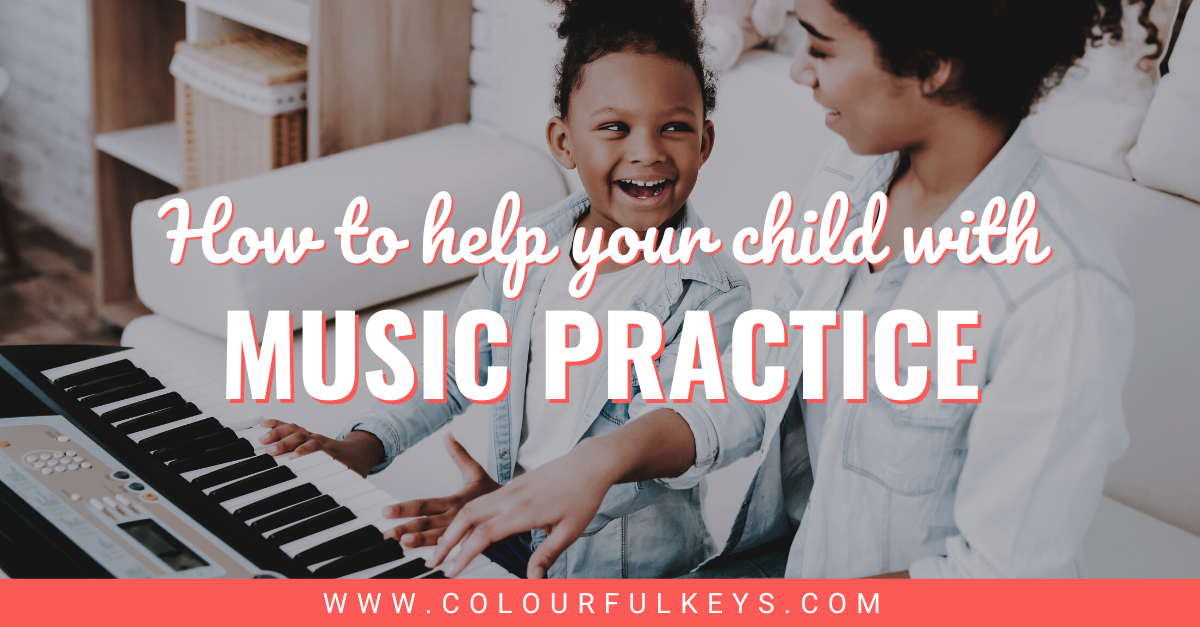Colourful Keys is primarily a blog for music teachers. However, this article is part of a series for PARENTS of music students. If you’re a music parent, read on to learn how to help your child with practice! If you’re a teacher, feel free to pass the link to this article on to parents in your studio.
So your child is starting music lessons. Fantastic! You’ve probably heard of this thing called “practice”, but may not know what your role is in the practice equation.

Parents and guardians are vital to a child’s success with a musical instrument. Regular practice means the difference between motivation or feeling disheartened and giving up.
Huh? Did you think that if your child is motivated (first) then they would practise (second)?
This is a common misconception I hear from parents. The truth is, it’s a rare child who takes themselves off to practise their instrument entirely by themselves. Your child could be that exception…but I wouldn’t count on it.
For most students, the opposite is true. If an adult helps them to practise regularly, then they make good progress. Over time, they learn that putting in the practice is worth it for the feeling of learning cool, new things.
But if they don’t have the support, they won’t get to experience that feeling of accomplishment.
So let’s look at your role in practice, based on different age groups.
Ages 8 and Under
Age 7 or 8 (depending on who you ask) is often called the “age of reason”. Children around this age and under are not capable of structuring their own practice time.
Your child may or may not do their school homework without reminders from (or a structure created by) you. But they are even more in need of your help to practise piano, as they need to go it alone without a teacher all week between lessons.
If your child is aged 8 or younger when they begin music lessons, here’s what we recommend to help your child with practice:
- Go through their assignments as soon as they get home from their lesson. If your teacher uses an app, notebook or binder for practice notes, read them out loud together.
- Sit down with your child and make a plan together for when they will practise. Consider the family schedule and find a time each day when they can reliably get to their instrument.
- Set reminders in your phone for these times to help you follow through.
- At the start of each practice time, read through the practice notes again together.
- Ideally, sit beside your child while they practise to guide them. If they prefer to be more independent with their practice, stay within listening distance so you can pop your head in if they get off track.

After the first year, you may stick with this level of involvement or you may ease off slightly if that’s what feels right to you and your child. You should always be the one keeping the practice routine consistent, but you might let them structure their practice sessions using the teacher’s notes if you feel your child is ready.
Ages 9 – 12
If your child is a little older, they may be able to take a bit more ownership over their practice. To help your older child with music practice, we would still recommend sitting down together right after they get home from their lesson to go through the assignments, working together to make the schedule for when they will practise and giving them reminders at those agreed upon times (just like with the younger age group).
Depending on your child’s personality, they may enjoy having you sit beside them during practice, too, even if it’s just for a few minutes of the practice session. If they prefer not to have you right there, though, that’s fine. As long as they are following the teacher’s notes, they should be able to manage their time quite well.
Do ask a few questions about the things you know they’re working on so they know you’re interested. Occasionally, you can ask them to teach you something they learned recently in music. Teaching you will solidify their learning and give them a great confidence boost.
Teenagers
Teenagers can be trickier. They are literally built to push back against their parents and guardians as they start to work towards independence.
However, that doesn’t mean they’re capable of managing everything themselves just yet. Teenagers’ hormones and brain-pruning stages often mean they’re less organised than they were at age 10.
With that in mind, your most important role is in helping them find the times they will practise. Sit down with them (when they are in a calm frame of mind) and go through their schedule to find good times for them to work on their music. Many teenagers are balancing several activities, increased homework and a much more active social life than they had when they were younger.
Even if they just find pockets of 10 minutes here or there in the day, they can make good progress with these shorter chunks of practice time.
Teenagers still need to hear your praise, too! They may act embarrassed or roll their eyes at you, but don’t stop telling them when you hear how much progress they made on something. ❤️
For more tips on how to help your child with music practice, you might want to check out the Piano Parent Podcast.

What’s your biggest struggle with music practice?
Feel free to leave your questions in the comments, and we’ll do our best to help.
Hello!
Is there a printable version of this I could give to parents? Or is the idea that I would send them the link to this article?
Thanks,
Liz
Glad you find this info helpful. Our thinking is that you’d send the link to parents. Stay tuned for more “piano parent” articles to come!
How engaged should parents be when it comes to their child’s musical education and practice? Greeting : Telkom University
Yah, my first thought was “I want to print this off to give to parents.” 🙂 I get that sending them a link means that other links within the article work,… but I honestly think that printing it off to hand to my parents during a lesson or workshop might go farther…
I think a digital or printed version is personal preference. It’s just good that you’re keeping the parents in the loop.